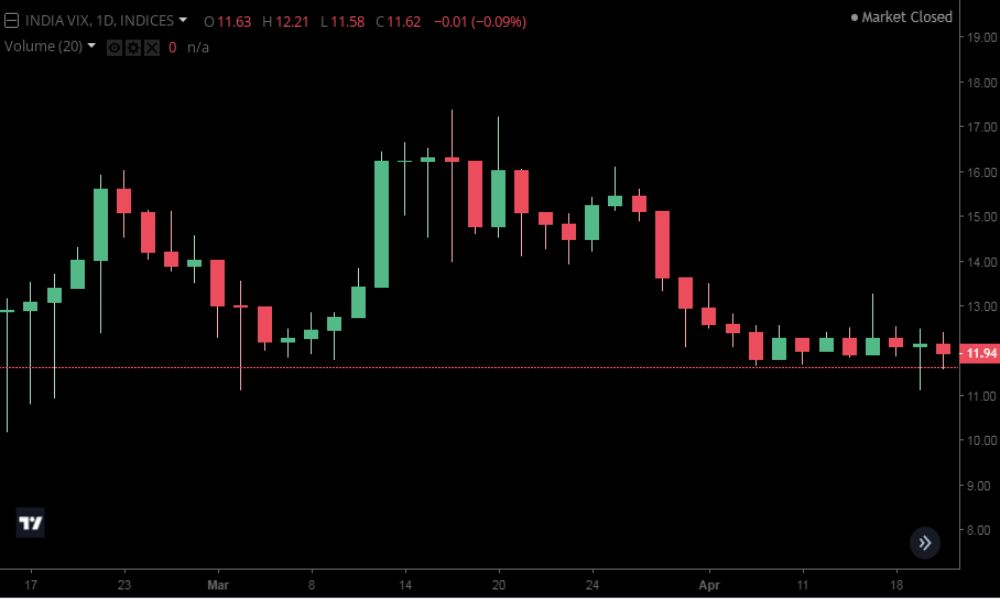Retail investors’ strategy to invest long-term prevented them from selling their investments during the financial turmoil
Despite bank failures and financial turmoil in March this year, retail investors avoided significant losses as the Indian equity market experienced an eight percent decline in volatility (VIX), protecting investors’ investments, unlike previous crises.
India equity markets were expected to suffer losses with increased volatility following the failures of multiple banks and rate hikes by the US Federal Reserve, but the volatility in the stock market, measured with VIX, registered an eight percent decline to 12.94 points in March.
Investment advisors and stock market analyzers attribute the fall in volatility to the timely interventions by the respective governments. Shanu Kumar, a stock market trader, and mentor said, “The impact in the Indian market fell as a result of the interventions by the US government and the Switzerland Central Bank to assure the investors.” He added that the Indian market will not always mimic the US and the other developed markets, and said that the market will move according to the position taken by institutional investors.
Kalpesh Ashar, a SEBI Registered Investment Advisor said that during this financial turmoil, retail investors did not suffer losses like they did in the previous ones.
Barath, 21, an investor in the stock market through Groww, an online brokerage app, said that he was sure that these banking failures will erase all his profits and turn his portfolio negative. “I expected that market will crash like when COVID struck. But, I was surprised to see that the investments came back to almost the level it was before.” His investment fell to around six percent but recovered in one to two weeks. He did not sell his investments when there was a panic in the market due to the fall of the banks. Shanu Kumar also said his trades did not see many losses and recovered all losses by the end of the month.
Akash Prakash, Amansa Capital, wrote in the Business Standard, “What has been surprising is the equity market volatility has hardly risen through all this fixed income chaos. The VIX index, measuring equity volatility, has still not reached its highs of 2022, forget the Global Financial Crises(GFC), 2007-2008..”

During the previous meltdowns and crises, VIX showed huge rises. In a monthly scenario, VIX jumped 30 percent during the beginning of the Russia-Ukraine war, the NIFTY 50 fell by over three percent. VIX jumped over 100 percent and over 10 percent in the first and the second COVID waves respectively which led to a decline of about 30 percent and two percent on the NIFTY 50 index. Even during the GFC Indian investors faced heavy losses with high volatility. In March 2023, the NIFTY and SENSEX recovered their losses when the market closed for the month.
Experts say this is mainly because of the liquidity pumped in by Mutual Funds (MF) and the change in investment attitude of the retail investors. Ashar said that with the MF’s long position and RBI’s governance, the equity and the debt market stabilized and retail investors did not suffer losses. “Because of the long-term investment strategy followed by the investors, they did not pull out or redeem their funds from mutual funds,” he said and added that this led to a net long position by the MFs. He also said that the change in the retail investors’ strategy to invest long-term prevented them from selling their investments during the financial turmoil.
The equity mutual funds saw a net inflow of Rs. 20,764 crores in March 2023, the highest in the last year, boosting the liquidity in the market. The total Assets Under Management (AUM) of the industry in March 2023 was at Rs 39.42 lakh crore, compared to Rs 39.46 lakh crore in February 2023.
Ashar also said that investors did not exit the market once the news of the banking failure broke out. “Investors did not sell their investment as the investing mindset has evolved in recent years. Retail investors focus on long-term strategies and it is far more strong and is evolving,” he added. RBI’s governance by focusing on inflation and proper credit flow in the system, along with MFs net inflow, helped the Indian market to sustain the overseas turmoil.




